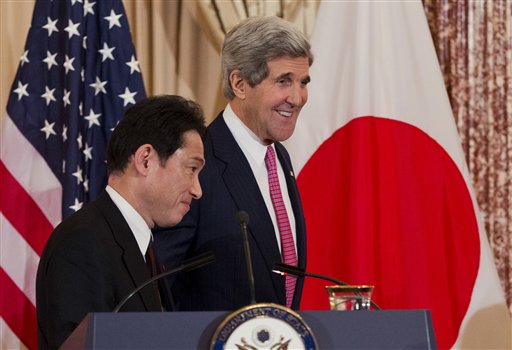
Secretary of State John Kerry and Japanese Foreign Minister Fumio Kishida walk off after speaking after their meeting at the State Department in Washington, Friday, Feb. 7, 2014. AP
WASHINGTON— Japan assured the U.S. Friday that it will respond calmly to actions by China that have increased tensions between the two Asian powers.
As a treaty ally of Japan, the U.S. could be drawn into a conflict between Japan and China over disputed islands in the East China Sea. Security forces of the two nations have engaged in a cat-and-mouse but avoided confrontation over the past year as China stepped up patrols in the area.
After meeting Secretary of State John Kerry, Japan’s Foreign Minister Fumio Kishida said they agreed they will respond “calmly and with resolve” to China’s actions, including its recent declaration of an air defense zone over an area including the uninhabited, Japanese-controlled islands, which it calls Senkaku and China calls Diaoyu.
Kerry said the U.S. was committed to upholding its treaty obligations with Japan including in the East China Sea. He reiterated the U.S. did not accept the air defense zone.
“We are deeply committed to maintaining the prosperity and the stability in the Asia-Pacific. And that won’t be possible without respect for international law, including freedom of navigation and overflight,” Kerry said.
Both diplomats affirmed the importance of finalizing a 12-nation free trade agreement, the Trans-Pacific Partnership, that has run into opposition from President Barack Obama’s fellow Democrats. Obama is expected to visit Japan in April, and the TPP is a key plank of his push to deepen American engagement in Asia and capitalize on its fast economic growth.
Referring to the U.S. and Japan as the world’s two largest free market economies, Kerry said, “finalizing the TPP is one of the most important things that we can do for our countries’ economic futures.” Kishida said Japan agreed to cooperate for a “prompt conclusion” of the negotiations.
Kerry, however, acknowledged differences remain to be worked through. Analysts say likely sticking points for the U.S. include access to Japan’s auto markets and heavily subsidized agricultural sector.
Kerry is traveling to East Asia next week and is expected to visit China and South Korea. Other than the standoff between China and Japan, the U.S. is concerned about tensions between Japan and South Korea, another key U.S. ally, and Japanese officials said that was a prominent topic in Friday’s talks.
Kishida said Japan will make “tenacious efforts” to build a cooperative relationship with South Korea.
Like China, South Korea has been angered by a recent visit by Japan’s prime minister to a controversial war shrine in Tokyo, which has deepened resentment in both of the neighboring countries over Japan’s colonial past and abuses committed during World War II. Japan says it is willing to hold high-level dialogue with both nations to ease tension, but there appears little immediate prospect of that happening.
RELATED STORIES
US, Japan plot move as tension over China’s air defense zone rises
China ships sail through disputed waters as tensions simmer
China urged to act vs Japan overflights